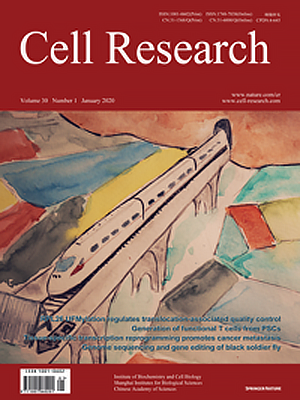
Advanced Search
Submit Manuscript
Advanced Search
Submit Manuscript
Volume 30, No 1, Jan 2020
ISSN: 1001-0602
EISSN: 1748-7838 2018
impact factor 17.848*
(Clarivate Analytics, 2019)
Volume 30 Issue 1, January 2020: 34-49
Shuaishuai Teng1, Yang Eric Li 2,3, Ming Yang1, Rui Qi1, Yiming Huang2, Qianyu Wang1, Yanmei Zhang4, Shanwen Chen5, Shasha Li1,Kequan Lin2, Yang Cao1, Qunsheng Ji6, Qingyang Gu6, Yujing Cheng2, Zai Chang2, Wei Guo 7, Pengyuan Wang5, Ivan Garcia-Bassets8,Zhi John Lu2 and Dong Wang 1,9,10
1MOE Key Lab of Bioinformatics, Department of Basic Medical Sciences, School of Medicine, Tsinghua University, Beijing 100084, China; 2MOE Key Lab of Bioinformatics, Center for Synthetic and Systems Biology, School of Life Sciences, Tsinghua University, Beijing, China; 3Ludwig Institute for Cancer Research, 9500 Gilman Drive, La Jolla, CA 92093, USA; 4PKU-THU Center for Life Sciences, Tsinghua University, Beijing, China; 5Division of General Surgery, Peking University First Hospital, Peking University, Beijing, China; 6WuXi AppTec (Shanghai) Co., Ltd., Shanghai 200131, China; 7Zhejiang University-University of Edinburgh Institute, Haining, China; 8School of Medicine, University of California, San Diego, La Jolla, CA, USA; 9Collaborative Innovation Center for Biotherapy, West China Hospital, Sichuan University, Chengdu, China and 10School of Basic Medical Sciences, Chengdu University of Traditional Chinese Medicine, Chengdu 611137, China
https://doi.org/10.1038/s41422-019-0259-z